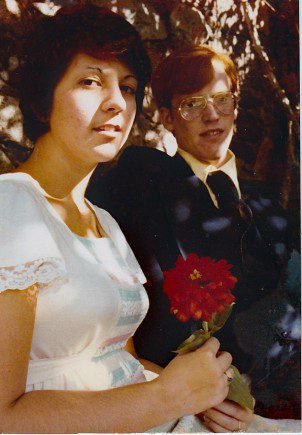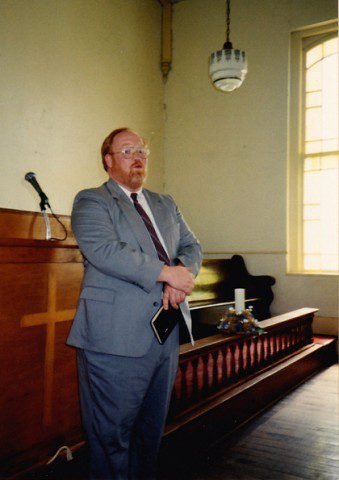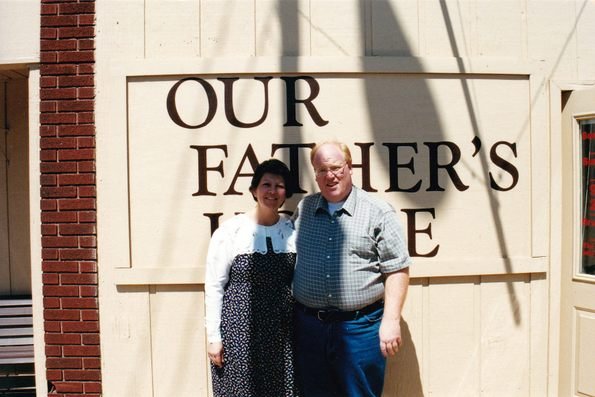I don’t know why I keep trying. What follows is a discussion I had on a friend’s Facebook page today with a local liberal Christian — a mainline Lutheran. The focus of the discussion is a meme I posted to my page, which my friend shared on his page.

Christian: What an awful perspective. God is love and that is what Jesus preached. There are some things in the Old Testament that are questionable. Life and everything is how you choose to take it and live it. I choose love and happiness not the negative aspects. Those who do not believe don’t believe in God or Jesus so non of this(what the Bible says) matters to them. One does not have to believe to be a good person.
Christian: That is Old Testament. He gave us Jesus so our sins will be forgiven. We experience pain and suffering as a result of this world. I teared up the other night at my brother’s concert because of the wonderful message. ✌🏼❤️
Christian: He also gives us free will-big mistake on some people’s part!! I myself, have not made some good decisions and have suffered physically but I have turned to God to help me through these. He never promised that we will not suffer. I also don’t understand why some people suffer much more than I have and why He hasn’t stopped it. I am with you there!! Also some people take being a ‘Christian’ to a level that God never intended. It doesn’t make them any better than someone else!
Bruce: Well, it matters to the degree that their religion materially affects me. Evangelicals, in particular, don’t seem to want to live and let live. They are Heaven bent on shoving their religion down my throat and evangelizing my grandchildren (Lifewise Academy) who attend public schools. The primary Christian sect behind the 1/6 Insurrection? Evangelicalism.
Bruce: I didn’t read the comments you objected to, but you did make theological claims about the nature of God, the sovereignty of God, and Freewill. While I understand you are just stating your opinions, you did posit that your peculiar brand/flavor of religion is superior to others. Surely it is fair for someone to question/challenge your hermeneutics — in a friendly way, of course. Now if your intent was just to give a testimonial . . . that’s different.
For record, I was part of the Evangelical church for fifty years; a Bible college trained pastor for twenty-five years. I am now an atheist (and a liberal, politically.)
Christian: I did not post that my peculiar? brand/flavor of religion is superior to others. That is a lie. You are far from your biblical roots. Also politics and religion should not mix-that statement is irrelevant. You had better review your hermeneutics and learn how to be a better truthful,respectful person. You have fallen off the boat and are unfortunately have drowned in your hatefulness instead of the love of God. Yes, I am shaking-I don’t deal well with people like you.
Christian: I agree with your statement about evangelicals. I was in no way shoving my religion down someone’s throat. I was just stating what I have learned as a lifetime Lutheran. I can understand why you left that particular ‘kind’ of church.
Bruce: Wow.
You said:
“What an awful perspective. God is love and that is what Jesus preached. There are some things in the Old Testament that are questionable. Life and everything is how you choose to take it and live it. I choose love and happiness not the negative aspects. Those who do not believe don’t believe in God or Jesus so non of this(what the Bible says) matters to them. One does not have to believe to be a good person.”
This is a theological statement. You objected to the meme by positing that your religion of “love” (which you showed none of in your response to me) is better/superior/Christ-like.
You don’t know me, yet you think it’s okay to personally attack me. Let me share with you what the Bible says about such behavior:
“Answering before listening is both stupid and rude.” Proverbs 18:13
Bruce: You don’t know anything about me, yet you have jumped to all sorts of conclusions.
The reasons for my deconversion are many. I would be more than happy to share them with you.
You seem to confuse directness with hatefulness. I am the former, not the latter. Ask around. I doubt you will find anyone who says I’m “hateful.” Life is too short to hate.
Bruce: Virtually every Abrahamic religion believes in the sovereignty of God — God is in control. If humans can thwart the will and actions of God, he is not in control.
The Bible has much to say about God’s absolute rule and authority, right down to who he does and doesn’t “save.” Man doesn’t have free will in a soteriological sense. We “choose,” but only because God chose (election, predestination) us first. Even science today questions whether humans have “free will” — in the colloquial sense of the word. Most people think they have naked free will/libertarian free will. It “seems” right. I suspect, however, it’s not.
Christian: Yes love is better than hate. Then why do you say hateful things to me? Love IS Christlike. Truth is better than you telling lies about me by saying things I didn’t say. (Or misinterpret what I said)Calling someone stupid and rude is worthy of turning you into the Facebook police. I am done with your hate and negativity. Deconversion (Do you think it makes you superior by using big words?)
Bruce: sigh. I didn’t say anything hateful to you. I’m sorry that you can’t see that.
Bruce: deconversion: The loss of faith in a given religion and return to a previously held religion or non-religion (typically atheism, agnosticism, or rationalism).
Christian: I know what deconversion is.
Christian: I am also sorry that you did not take in ALL that I wrote either. I agree with you about leaving the ‘church’ that you left-Baptist- evangelical,I believe?(And also we share the same political views.) All I was doing is sharing what I think and follow. It always seems to turn nasty when people talk about their faith and it doesn’t have to be that way. Why can’t we just talk and be decent human beings? I do not quote the Bible or get philosophical. I know what I believe (and do question some things in the Bible). I use what brings me peace. I am highly educated but I think it is offensive when people pull out the big words or quote from the Bible. I would love to hear why you left organized religion but I wouldn’t want it to turn into a debate. I have had my beliefs for 74 years and will go to my grave with them. I am at peace in my life and wouldn’t like it any other way. I hope you too have found peace(I said that to another atheist friend of mine and she didn’t like it).
Bruce: When you share your beliefs/opinions/ruminations on social media, you should expect people to respond. ‘Tis the nature of the medium.
Christian: Yes, I read everything and why should I care what you were before. I was just saying I agree and can see why you left the evangelical church. You are the one who seems to jump to conclusions!! I try to say something nice and you turn it around-there lies the problem with our colliding personalities!!! Randy is a terrific person but I no longer will comment on his religious/ non religious posts.
Bruce: This has nothing to do with colliding personalities. I do agree that Randy is a terrific person — 98.9% of the time.
You have made several wrong assumptions about the trajectory of my life. My beliefs — theological, political, social — evolved over the twenty-five years I spent in the ministry. Just because I once was an Evangelical doesn’t mean I always was one.
Bruce: Words have meanings. Deconversion and its cousin deconstruction are not “big” words. They (generally) accurately describe the process of loss of faith. You seem to think, without evidence, that I used the word “deconversion” so I could be “superior.” I used the word because it best describes the process of loss of faith.
Sigh, right? (Please see Why I Use the Word “Sigh”.) My goal was to meaningfully interact with this woman, hoping to share with her my perspective on the meme and Evangelical Christianity. I could have went after her incoherent theological beliefs, but I chose not to. For whatever reason, she made it personal. In her mind, I was being “hateful” towards her. My words were so offensive that they should be reported to Facebook! Worse, she attacked my character, suggesting that I was trying to be the smartest guy in the room by using big words. By the time our discussion concluded, I wondered who the Hell she was talking to. It sure wasn’t me. 🙂
As readers know, I am more than capable of eviscerating people with words. I can be snarky, but generally, I try to be respectful, knowing that lurkers are reading my posts/comments. While most of my interactions are with Evangelical Christians, I do, on occasion, cross swords with liberal/mainline Christians, I find discussions with them to be quite frustrating, much like trying to nail Jell-O to the wall. As the aforementioned Christian showed, she has spent 7 decades picking and choosing what she wants to believe. All Christians are cafeteria believers, but liberal believers have turned it into a fine art. In their minds, the Bible is a book of suggestions. The OT God is different from the NT God. They focus on the LOVE of God, ignoring his judgment, wrath, and holiness. In other words, they do what all Christians do: shape and mold a God in their own image.
And that’s fine. I much prefer liberal Christianity when it comes to good works and the mark it makes on the world. Evangelicalism is harmful, both psychologically and physically. It destroys lives, harming children and adults alike. I have been blogging for almost sixteen years. There’s never been a time when someone left a comment on this site that said “liberal Christianity ruined my life.” I am good friends with several liberal Christians. I love the fact that we can talk about anything. That’s not the case with Evangelicals. Why? Liberal Christians have few theological hills they are willing to die on. Evangelicals, on the other hand, see every molehill as Mount Everest.
During the deconversion process, I tried to embrace liberal Christianity. I desperately wanted to hang on to “God.” Unfortunately, I found liberal Christianity to be intellectually unsatisfying. I found myself saying, “why bother”? What I was left with was a social club of sorts, with wonderful, thoughtful people as members. This was not enough for me, especially during football season. 🙂 While I genuinely love and respect my mainline Christian friends, I cannot intellectually embrace their beliefs. I love their good works, but not their theology.
In early 2008, Polly and I and our three youngest children attended Grace Episcopal Church in Defiance. Grace is a dying congregation of mostly elderly people. The music was atrocious, and on Sundays when the priest wasn’t there, the lay sermons were droning monuments to incoherence. We loved the priest and found the congregation to be friendly toward our family (though no attempt was made to assimilate us into the congregation). On our first Sunday there, one of the matrons of the church said to us “Welcome. You can believe anything you want here.” In this particular church, the Bible and theology were irrelevant.
In the fall of 2008, we attended Ney United Methodist Church for a few months. We loved the pastor and his family. The music was more lively than the unsingable high church music at Grace, but no attempt was made to embrace us as a part of the membership. The pastor (who is an Evangelical), Ron Adkins and I got along famously. We had numerous conversations about Evangelicalism and theology. However, by this time it was too late. Fourteen years ago this coming Sunday, we walked out of the doors of the church never to return. A letter to the editor of the Defiance Crescent News I wrote two years after we left the church caused a problem for Ron. He decided to publicly respond to me, ending our relationship. (Please see Evangelical Pastor Ron Adkins and THE Agnostic.) Evidently, my letter caused a stir in the membership, so he felt obligated to respond to me. Ron no longer pastors the church. For a time Ron was associated with the Free Methodist denomination. Presently, he pastors the Urbana Church of Christ in Christian Union in Urbana, Ohio. (I pastored a Christian Union church in Alvordton, Ohio in 1995.)
Polly and I attended other liberal/mainline churches as we attempted to find a church home. What we typically found was awful music, barely tolerable preaching, and nice people who took no interest in trying to engage us at any meaningful level outside of shaking our hands. Of course, we found these same things in Evangelical churches too, although Evangelical music tends to be more inspiring and singable. While our politics, social beliefs, and pacifism better aligned with the liberal/mainline churches we visited, we found their lack of passion and interest off-putting. In the end, both of us came to the conclusion that we had no interest in trying to breathe life into corpses.
Bruce Gerencser, 68, lives in rural Northwest Ohio with his wife of 47 years. He and his wife have six grown children and sixteen grandchildren. Bruce pastored Evangelical churches for twenty-five years in Ohio, Texas, and Michigan. Bruce left the ministry in 2005, and in 2008 he left Christianity. Bruce is now a humanist and an atheist.
Your comments are welcome and appreciated. All first-time comments are moderated. Please read the commenting rules before commenting.
You can email Bruce via the Contact Form.













